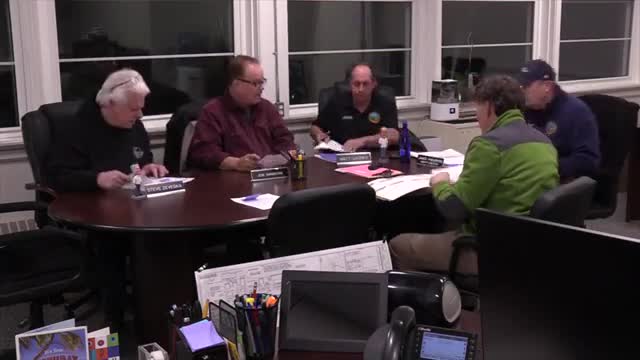Board approves variances for septic work at 33, 35 and 37 Leland Drive after adjacent-well test shows coliform
Get AI-powered insights, summaries, and transcripts
Subscribe
Summary
The Town of Charlton Board of Health on Feb. 11 approved local upgrade variances to allow a conventional septic system for 35 Leland Drive and setback reductions for neighboring wells at 33 and 37 Leland Drive.
The Town of Charlton Board of Health on Feb. 11 approved local upgrade variances to allow installation of a conventional septic system for a property at 35 Leland Drive and associated setback reductions for neighboring wells at 33 and 37 Leland Drive.
The variances permit a septic system sized roughly "330 gallon per day" as described in the meeting, sited behind the house where the existing shed now sits, with setbacks greater than 50 feet but less than 100 feet from the abutting wells. The board voted to accept the plans as presented by McClure Engineering; the motion carried with members answering "Aye."
The matter drew attention after a contractor and engineer, Chris McClure of McClure Engineering, told the board the site contained a failed cesspool and that a conventional Title 5 system had been designed based on soil testing. McClure said the only feasible location for the new leach field was behind the house, and that the design used a 20-minute-per-inch percolation basis and maintained the system outside the 50-foot setback from the wells while requesting a reduction from the 100-foot setback required for certain adjacent wells.
Tom, a staff member who joined the meeting by phone and who reviewed the test results, said the plan was "about the best that you can do with the site" but noted that one abutter's well had tested positive for total coliform. He recommended approval contingent on the abutter taking corrective action — sampling, chlorination and flushing, then retesting — and discussed likely causes of the coliform result (a poor well cap seal, cracked casing or animal intrusion). Board members agreed the applicant should assist the abutter in retesting and making any corrective repairs; the board did not record a separate conditional motion on the public record beyond approving the plans.
Board members also discussed logistics for installing the proposed tank. Contractors at the meeting said a concrete tank would be difficult to place on the shallow driveway and that a plastic tank was a commonly used alternative; the meeting included informal cost and installation observations but no formal decision about tank type.
The engineer said adjacent-well testing showed total coliform present but no E. coli and that nitrate and ammonia results were "non detect." The board discussed sampling protocols and agreed the abutter's well should be resampled and, if necessary, chlorinated and retested before relying on it as a potable supply. Several members noted the department would assist with sampling and lab submission.
The board approved the plans and variances with a voice vote. Installation was discussed as likely to proceed when site access and weather permit in the spring.
Speakers quoted in this account are taken from the meeting record and appear above as identified.
